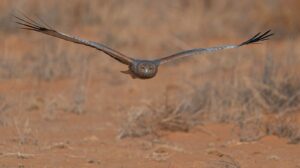
Owls, well adapted to hearing the exact location of prey, have something in common with an unrelated group of raptors - harriers.
A new study led by Canadian and Australian researchers has found that harriers across the world are able to keep a much better ear out for their next meal than previously thought.

The international team of University of Lethbridge and Flinders University researchers made the discovery when they found unexpected owl-like traits in the ear and brain of several harrier species, such as the Australian spotted harrier.
The new article published in Journal of Anatomy features the work of the Iwaniuk Lab at the University of Lethbridge in Alberta and Associate Professor Vera Weisbecker's 'Bones and Diversity Lab' at Flinders University in South Australia.
University of Lethbridge PhD student Sara Citron, who led the study, says owls have fine-tuned hearing abilities, allowing some of their species to locate prey in complete darkness.

"Until recently, it was assumed that all their hearing adaptations were unique to owls. However, our study shows that harriers have independently evolved several key adaptations for finding prey by sound," she says.
The research team focused on harriers - a group of hawks found in North America, Australia, NZ, Europe, and parts of Africa and Asia - because they show some unusual, owl-like hunting behaviours.
Senior author and PhD supervisor Dr Andrew Iwaniuk, Associate Professor at the Canadian Centre for Behavioural Neuroscience, says: "Hawks tend to hunt primarily by sight. But unlike other hawks, harriers fly low over tall grass with their beak pointed to the ground.
"During this so-called 'quartering flight', they are not only looking for prey, they are also listening for it," he says.
Co-author Aubrey Keirnan, a PhD student at Flinders University who is also co-supervised by Dr Iwaniuk and Associate Professor Weisbecker, says that simply by looking at the harrier, you can see similarities with owls.
"The Australian Spotted Harrier is a great example," she says. "When you look at this species' face, you can see a distinctive disc-shaped face, which may improve their prey localisation just like owls."
The discovery matches older behavioural studies showing that harriers can locate sounds with similar accuracy to owls, but how they did this has been a mystery.
Using specimens from wildlife rehabilitators and museums in Australia and Canada, the team examined the anatomy of the skull and brain of harriers and other closely related hawk species such as the wedge-tailed eagle.
They found that, like owls, harriers have enlarged ear openings and two expanded brain regions that are essential for calculating where a sound is coming from.

"These auditory nuclei are found in the brainstem and compare the time at which sounds arrive at the left or right ear," says co-author Associate Professor in evolutionary biology Vera Weisbecker, from Flinders University's College of Science and Engineering.
"If a sound arrives at both ears at the same time, then the sound is coming from directly in front of an animal. If there is a delay, this indicates that the prey is more to the left or right," she says.
"By having these two brain regions expanded, harriers can make such computations more accurately than other hawks, allowing them to locate where a potential rat, mouse or other prey is hiding in the grass."
"Harriers have therefore evolved an auditory system similar to owls, enabling them to target sounds as accurately as owls in a remarkable example of convergent evolution of both brain and behaviour in animals separated by over 60 million years," adds first author Ms Citron.

The team is careful to point out that the auditory system of many owls is far more sophisticated than that of harriers. This explains the ability of some owl species, such as the barn owl, to hunt in complete darkness whereas hawks only hunt during the day.
"There are several other features that help owls with their keen hearing which we did not find in harriers. For example, some owl species have asymmetric ears that allow them to locate sound with greater acuity, and these owls also have several other enlarged brain regions that were not enlarged in harriers," says Ms Citron.
The team hopes their study results will encourage further research on bird anatomy to find out how a species perceives its surrounds.
"Anatomical studies like ours are a window into how a bird perceives the world around it, which can be extremely useful for bird conservation," adds Dr Iwaniuk. "For example, harriers' reliance on sound for prey location means that they are likely more sensitive to traffic and industrial noise. This could be contributing to the large decreases in Northern Harrier populations we have seen in Canada."
The article, 'The evolution of an "owl-like" auditory system in harriers: Anatomical evidence' (2025) by Sara Citron, Cristian Gutierrez-Ibanez, Aubrey Keirnan, Vera Weisbecker, Douglas Wylie, Andrew N Iwaniuk has been published in Journal of Anatomy (Wiley Online Library) DOI: 10.1111/joa.14264.
First published: 29 April 2025 https://doi.org/10.1111/joa.14264






